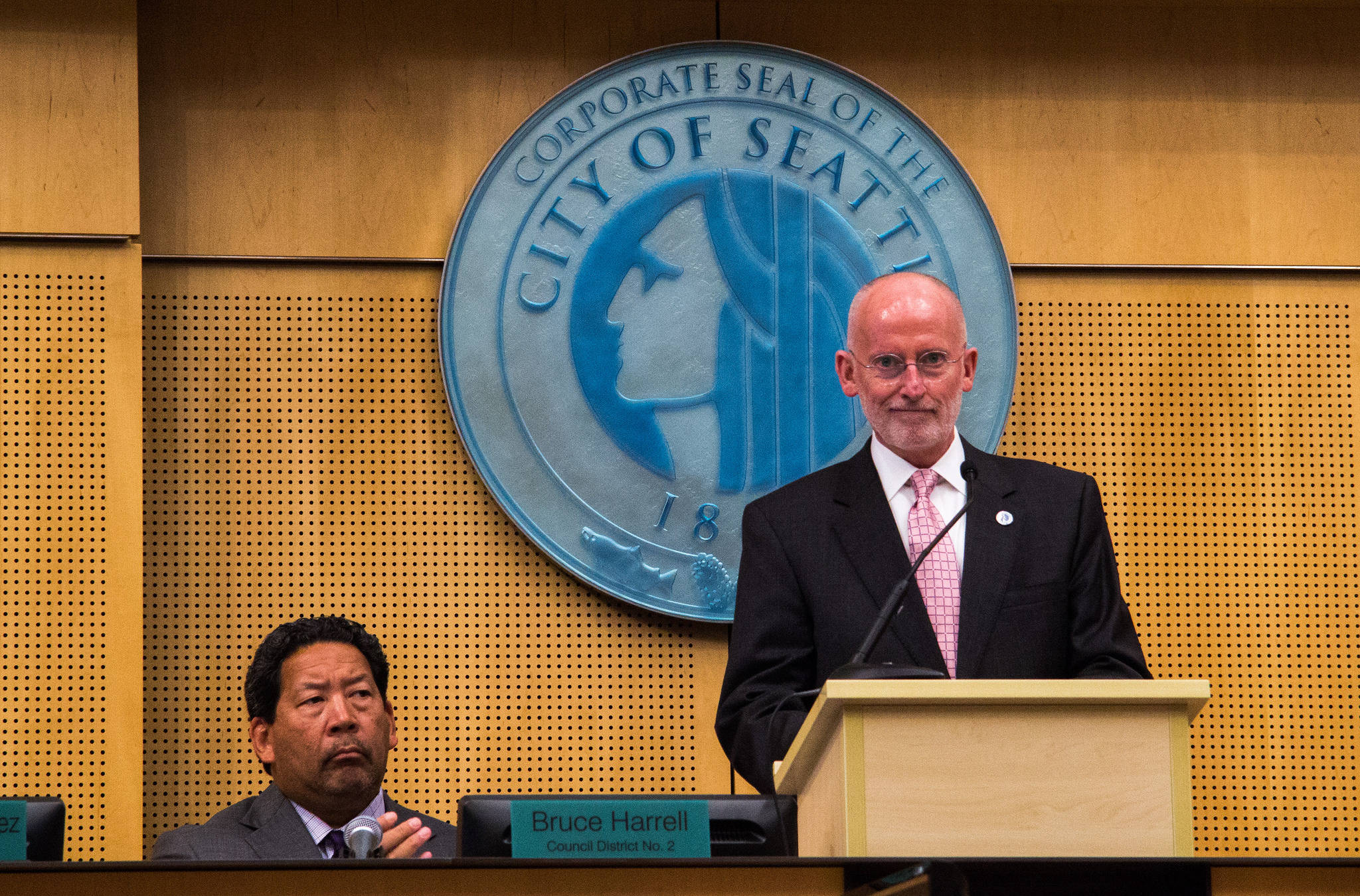On Monday, interim mayor Tim Burgess presented his proposed 2018 city budget to Seattle City Council. Contrasting Seattle’s good governance against President Trump’s reactionary policies, Burgess said that his budget would increase funding for programs to support survivors of sexual abuse and to confiscate guns from domestic abusers.
Burgess began with an oblique reference to the circumstances which brought him to office—the disgraced resignation of former Mayor Ed Murray following allegations that he sexually abused minors decades ago. “For all affected by the scourge of sexual violence, and for all involved in the particular events that have shaken us so recently, we wish appropriate measures of justice and continued steps forward along a healing path,” said Burgess to a Council Chambers packed with journalists and city employees. “To survivors, I want you to know your city government stands with you. We will support you. We will walk with you on that path toward healing.”
Specifically, the proposed budget would allocate $500,000 “for services for adult and child survivors of sexual abuse,” according to the mayor’s office. It also earmarks $162,000 for enforcement of a law that allows judges to confiscate the guns of people subject to a domestic violence prevention order.
“Washington State now says that if you abuse your partner, you lose your gun,” said Burgess, referring to a state law passed in 2014. “This is appropriate, because we know how often acts of domestic violence turn into murder. But what’s inappropriate is to create such a law without providing resources to ensure that abusers’ guns are actually surrendered.” This budget, Burgess said, would fix that oversight, in part by funding more SPD detectives to work on domestic violence cases.
The proposed budget would use $14.8 million in anticipated tax revenue raised by the new sweetened beverage tax to pay for free college, healthy food subsidies, and support programs for students and youth. Another major item is a plan to set up a portable Seattle Retirement Savings Plan that will automatically apply to workers in the City of Seattle unless they opt-out. The goal is to make retirement savings plans available to workers whose jobs do not offer them, and to allow workers to transfer their retirement savings between jobs.
“40 percent of our workers have no access to a workplace retirement savings plan,” said Burgess. “That’s about 200,000 of our fellow Seattleites looking toward their later years with a feeling of financial uncertainty and the constant, low-grade dread that brings…They are disproportionately Black, Latino, and Asian. In one of the wealthiest cities in America, we can do better for our workers.”
Burgess’ proposed budget also asks for more money with which to construct emergency shelters and affordable housing. It also permanently funds the Navigation Teams and Emergency Operations Center which coordinate homeless encampment evictions. The city is currently facing a lawsuit by the state ACLU over its eviction practices. The proposed budget includes funding for a new homelessness spokesperson who will meet increased “demand for public accountability,” according to an executive summary of the proposed budget.
The proposed budget also increases funding for hiring new Seattle Police Department officers, with the goal of increasing the number of sworn officers by 15 percent, or about 200 more than were employed in 2013. It would also fund more 911 dispatchers, and pay for the establishment of new police oversight bodies including an Inspector General office.
“Black lives matter,” said Burgess, eliciting sudden applause from the audience, which was mostly city employees. “We must squarely face our history of racism and injustice, and, frankly, that’s something I don’t believe our country has truly done. We will know that we have when all people of color have equal opportunity, equal protection under the law, and never doubt their standing as Americans.”
According to the mayor’s office, payouts to settle lawsuits and other legal claims against the city increased sharply starting in 2016. Payouts this year are already almost $4 million more than the city had anticipated based on past experience. In response, according to the executive summary of the proposed budget, “The City Budget Office will coordinate a comprehensive review…of the financial policies that currently govern” budgeting for legal settlements and legal risk management.
In the coming weeks, the City Council will review and amend Burgess’ proposed budget, then send back a revised budget for his signature. Lisa Herbold, who succeeded Burgess as council budget chair, says that she thinks Burgess’ proposed budget “does a nice balance of investments in things that have been longtime priorities for the city, investments in new priorities, as well as investments that are initiatives that this mayor wants to put forward—-for instance, the employee IRA accounts.” Herbold said nothing in the proposal immediately jumped out at her as a problem or omission.
Asked about Burgess’ request for more funding for Seattle’s homelessness response, Herbold said she’s been working with Council staff and the city auditor’s office to develop “a theory of change” for how to reform Seattle’s notorious homeless encampment evictions, though the details of that theory will get nailed down “concurrently” with this fall’s budget process. “I think expansion of the Navigation Teams will be tied to adhering to and reporting back on meeting” the objectives identified in that theory, she said.
cjaywork@seattleweekly.com








